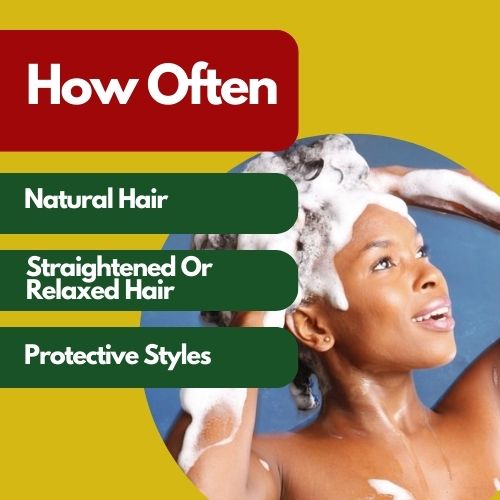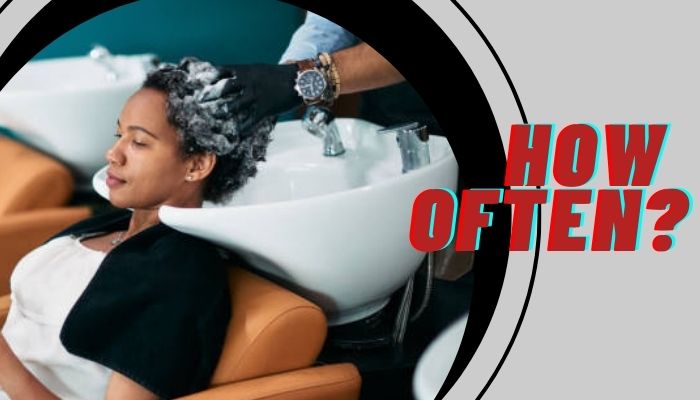How often you wash your hair as a black person largely depends on whether your hair is permed, natural, or in a protective style such as braids. Ideally, if your hair is in its natural state, it is biologically okay to wash it just once a week or twice a month.
The curly and coily texture of African-American hair is distinctive. When handling it, you need greater caution and focus. Black hair tends to be dry, so frequent washing is logically justified. But biology thinks otherwise. The lack of moisture from frequent washings will only result in drier hair. Therefore, once per week or once every two weeks is the ideal washing schedule for black hair.
Intense conditioning may be necessary before you wash your hair. While it’s recommended for black people to avoid over-washing their hair, it’s also not a good idea to go too long between washes. In this post, we examine the ideal methods for maintaining naturally curly, kinky, and wavy hair.
Also Read: Everything You Need to Know About Black People
How Often Should I Wash my black hair?
It depends on whether it is natural, relaxed, or styled.

1. Natural Hair
Environmental toxins and styling products cause your hair to get unclean over time. Due to the accumulation of dirt, black hair may feel greasy if it isn’t regularly washed, regardless of how dry it naturally is. Aim to wash your natural black hair once every seven to fourteen days. Utilize a gentle shampoo and conditioner for cleaning.
2. Straightened Or Relaxed Hair
Following a relaxer treatment, wait at least 7 days before washing your hair. Hair relaxers remove the natural oils from your hair, leaving it very dry. Shampoos are terrible for freshly relaxed hair since they also strip your hair of its natural oils. For your safety, wait at least a week before washing your relaxed strands.
Once the week-long grace period has passed, you are permitted to wash your hair once every 7 to 14 days.
3. Protective Styles
Your hair is shielded from the harsh sun and environmental harm by protective styles like braids, twists, or fake locs as well as from excessive breakage. Wearing a protective style, however, does not excuse you from performing your regular cleaning regimen!
Every two to three weeks, you can wash your braids. When washing your hair, pay special attention to your scalp and use a clarifying shampoo to remove grime and buildup.
Also Read: Black People Statistics You Probably Didn’t Know About!
Why you should wash your black hair weekly

The classifications and subcategories of hair vary. Most often, type 4 is the classification for African-American hair. Based on how it looks, feels, and has a different texture, it is further categorized into three categories (4a, 4b, and 4c).
It’s challenging to handle type 4 hair because it’s exceedingly curly and coiled. Compared to other types of hair, it also tends to be drier and coarser. The flat oval follicles’ shape, which makes it challenging for sebum to pass through the hair, is the cause of this coarseness.
Therefore, you must keep the hair’s small amount of sebum. Your kinky hair won’t benefit from more frequent washing than once per week.
Black hair requires a different approach from other types of hair because of its distinctive qualities. All hair types, particularly afro hair, should be washed frequently to get rid of extra oil, grime, styling products, and other debris that collect on your hair and scalp.
However, since natural black hair is drier and more fragile than other kinds of hair, it is not advisable to wash it too often.
But how do you wash your kinky hair?
How do you wash black hair?
It’s vital to handle black hair with particular caution because it has a tendency to be drier and more delicate. We outline a suitable routine to get your hair ready for washing below. Follow these instructions to give your black hair a vivid, lovely, and lustrous appearance.
1. Pre-Shampoo Treatment

Before washing, you must properly untangle your black hair. Simply use your fingers to separate your hair strands, then comb through them with a wide-toothed comb to achieve this. Use a moisturizing oil to make the process easier, such as coconut or olive oil. These oils have a deep conditioning effect that makes your hair easier to manage.
Your hair will be softer after washing if you use a pre-shampoo oil since it makes detangling your hair easier. Before washing it off, let the oil sit in your hair for at least 30 minutes. Although this oil treatment is fantastic for nourishing your hair, you don’t always have to use it.
2. Rinse
Remove the cap, then work any tangles out by running your fingers through your oil-treated hair. After that, turn on the shower and rinse your hair for a few minutes with lukewarm water.
A quick and simple technique to get rid of any buildup on your scalp is to rinse your hair.
3. Shampoo

In the shower, thoroughly wet your hair.
To get rid of any product buildup or dirt, start by using a clarifying shampoo. Concentrate on your scalp, but also take a moment to run the shampoo through your hair’s strands.
To moisturize your hair, rinse it out and repeat the procedure with a moisturizing shampoo, being careful not to tangle your hair as you lather.
Warm water is preferable to hot water since it helps to open the cuticles and allows your hair to absorb more moisture.
4. Condition

It is crucial to condition kinky hair after shampooing because it tends to be dry. After rinsing the shampoo off, gently compress or wring your hair to remove the extra water. Use a moisturizing conditioner now. Rub a good amount of the product through your hair, paying particular attention to the tips. Your hair’s ends require the greatest conditioning because they are the oldest portions of the strand. Watch out for the roots, as they may cause buildup.
For your hair to absorb the moisture, leave the conditioner on for five to ten minutes.
5. Detangle with a wide-tooth comb

Take your wide-tooth comb, and begin by concentrating on the ends of your hair. Clear away any noticeable tangles and knots before gently working your way up to your scalp.
6. Rinse out with cool water
Rinse your hair thoroughly with cool water to remove all conditioners. When you use cool water for the last rinse, your hair’s cuticles are forced to close, locking in all the moisturizing hair products you just used.
7. Drying
It’s time to properly dry your hair after a good wash. If not dried and treated carefully, curls can become unruly and difficult to maintain. Utilize a microfiber towel or cotton T-shirt to absorb extra water. Although using a hair dryer can seem like a simpler option, doing so puts your hair in danger of breaking.
Instead, use a cotton T-shirt or a microfiber towel to wrap up and dry off your hair because neither of these materials will cause your strands to become frizzy as they absorb moisture. Applying a styling gel now will allow you to style your hair.
Why Is conditioning so important for Black Hair?

An essential component of the black hair care routine is conditioning. It keeps your hair flexible, soft, and manageable.
Because African-American hair is more delicate and susceptible to environmental damage, conditioning is crucial.
Your hair feels smoother after using a good conditioner, which also helps to avoid breaking. Conditioners reduce friction by leaving a thin, wax-like coating on the hair strands. Soft, smooth hair is less likely to break and tangle. Additionally, conditioning lessens static and frizz while retaining hydration.
The following are three helpful suggestions for conditioning black hair:
- Every time you wash your hair, don’t forget to condition it. Shampoos have the potential to dry out your curls by removing their natural oils.
- An excellent approach to give your hair some much-needed hydration in between shampoo washes is using dry conditioners.
- If you have colored or bleached hair, consider getting a deep conditioning treatment now and then. Bleaching makes your hair more prone to damage, so you need to provide your tresses with extra nourishment. Use a good deep conditioner that is suitable for type 4 hair.
Frequently Asked Questions (FAQs)
Should I use hot or cold water for afro hair?
There is also a lot of debate about whether hot or cold water is best for washing black hair types – each has its benefits, to be honest. Warm, not hot, water is better for cleansing as it opens the cuticles and rids the hair of debris.
The issue with hot water is that it can leave your hair feeling dry as it removes all oils from your hair. Cold water constricts the cuticles and is not the best for removing dirt and product buildup. As such, it preserves natural oils and keeps your hair manageable and shiny. The best advice for black hair on wash days is to start with warm water and finish the process with cold water.
Can a black person wash their hair every day?
Black hair tends to be on the dry side; when you wash it frequently, it becomes even drier and is likely to break. To keep your hair clean and protected, dermatologists recommend washing your hair once a week or once every 2 weeks.
Should black people get their hair wet every day?
Yes, you can wet natural hair every day, and it is advised to do so to maintain moisture. Let’s be clear, though: by wetting your hair, we don’t mean re-wasting it. We simply mean rinsing natural hair either in the shower or by spritzing water over your hair.
How do black people keep their hair moist?
To moisturize African hair, try using a leave-in conditioner and natural oil. On the days you’re not washing your hair, apply a water-based leave-in conditioner. Once you’ve applied your conditioner, use a few pea-sized drops of natural oil like jojoba, coconut, or olive oil to coat your hair.
Which oil is best for African American hair?
Castor oil It’s one of the go-to oils for afro-textured hair types. It helps combat dryness and adds moisture to the hair. It’s also known to strengthen hair and stimulate hair growth. It’s also great for alleviating scalp and skin conditions such as itchiness and dandruff.
Now it’s your turn.
Black hair, often known as African-American hair, is classified as type 4 hair, consisting of extremely curly or coily hair. Since this hair type is so delicate, it requires careful maintenance to stay healthy.
It is recommended not to wash natural hair too frequently, but it also shouldn’t go too long between washes. For curly hair to stay healthy, regular washing is essential to prevent buildup, remove grime, and remove product buildup.
Wash your hair once a week or twice a month if you wear your natural hair in a protective style. It’s preferable to wash your hair once or twice every two weeks if it’s in its natural state. If you have relaxed hair, however, you should wash your hair weekly, depending on how greasy it gets.
How often do you wash your kinky hair?
Read Related Articles:
- Why do Black Girls Wear Wig?
- Why Does Black’s People Hair Grow Different?
- How Often Should I Use Rice Water on my Hair?
- How Often Should You Oil Your Scalp Black Hair?
- How Often Should You Wash African-American hair For Growth?
- Why Does Black People’s Hair Itch? Everything you Need to Know!
- Can Black People Use Dry Shampoo? Everything you Need to Know!
- Why Does Black People’s Hair Kinky? Everything you Need to Know!
- Does Black People’s Hair Get Greasy? Everything you Need to Know!
- Why Does Black People’s Hair So Dry? Everything you Need to Know!
- 21 Must-Know Hair Trends for Black Women That Will Be Big in 2023
- How is Black Hair Different from White Hair? Everything you Need to Know!
- Why Does Black People’s Hair Grow Slower? Everything You Need to Know!
